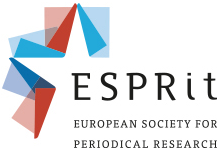Call for Papers: International Summer School “Coherence & Interruption: Seriality in Periodicals” (13–15 September 2018, Ruhr-University Bochum)
International Summer School “Coherence & Interruption: Seriality in Periodicals”
13-15 September 2018, Ruhr-University Bochum
With Laurel Brake (London), Ellen Gruber Garvey (New Jersey), Matthew Philpotts (Liverpool), Madleen Podewski (Berlin), Geoffrey Belknap (National Media Museum Bradford) and Members of the DFG Research Unit 2288 ‘Journal Literature’
The search for coherence is a fundamental mode of reception, just as the reading process of periodicals is structured by interruptions. With a systematic focus that encompasses the full range of periodical media formats, genres, and periods, the International Summer School investigates these mechanisms of seriality and will thereby shed light on structural similarities (and differences) across boundaries of genre, time, and media formats. Researchers in periodical studies at an early stage of their careers (PhD students and post-doctoral scholars up to five years after their PhD) are welcome to present their research projects and work together with peers and renowned experts on methodological and theoretical approaches concerning patterns of coherence and interruption in periodicals. Possible objects of investigation are the seriality of written texts, serial structures in graphic narratives, the ‘serial’ materiality of periodicals (i.e. their physical presentation including continuous layout, format, typography, or recurring illustrations, indexes, advertisements, etc.), or the temporal structures of periodicals. Seriality, in this sense, must be considered not merely as a narrative phenomenon, but rather as an effect of the media itself. Several questions may be addressed in the Summer School:
- How is seriality constructed within different periodical media formats in general and within the microcosms of their ‘content’? How are different features of the media format deployed in this regard?
- How is coherence constructed or irritated by mechanisms of the media formats? How are the ‘contents’ of periodicals arranged in order to indicate cohesion or discontinuity? What strategies are pursued to ensure the reader’s ‘loyalty’?
- How are journal issues filled in between sequels? In what relation do other contents stand to the focused ones?
- Which general strategies can be identified for different media formats, genres, and periods?
- How are coherence and interruption of the media formats linked with coherence and interruption within the literary texts?
- What methodological and theoretical approaches can be applied for the research of seriality of periodicals?
Submissions:
Project presentations should be 15 minutes long. The Summer School will be conducted in English. Subject to confirmation of funding, travel and accommodation costs are fully covered for up to 15 participants. Applicants should send a short abstract of their research project (maximum length 500 words) and a short CV (maximum length 150 words) to This email address is being protected from spambots. You need JavaScript enabled to view it. by 31 May 2018. Estimated Date of decision is 15 June 2018. Participants of the Summer School are also invited to take part in this year’s conference of the DFG Research Unit 2288 ‘Journal Literature’: Lektüreabbruch–Anschlußlektüren / Interrupted Reading–Follow-on Readings, Bochum, 17-19 September 2018. Please visit the website https://www.rub.de/ journalelesen for more information and indicate in your application whether you will stay for the conference. Organized by Mirela Husić, Nicolas Potysch, and Nora Ramtke Please address any queries to This email address is being protected from spambots. You need JavaScript enabled to view it. or This email address is being protected from spambots. You need JavaScript enabled to view it..
